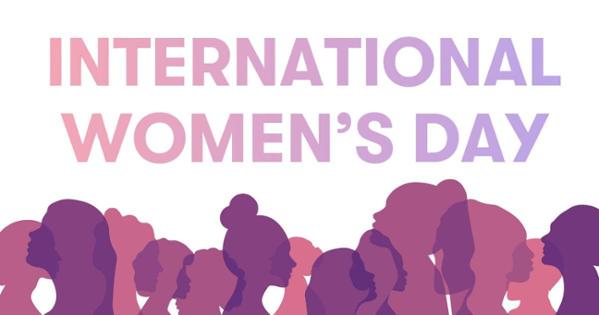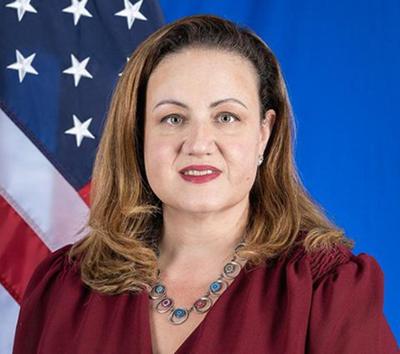SIS Alumna’s Career of Advocacy for Women

At just three years old, Katrina Fotovat, WCL/JD ’05, SIS/MA ’06, immigrated to the United States from Iran with her family. When she reflects on her time in the US, she often thinks, “What would my life be like if I were back in Iran?”
Protests in Iran that erupted after the death of Mahsa Amini in September 2022 and the ensuing Woman, Life, Freedom movement have placed a spotlight on women’s rights in the nation. Fotovat said the current state of human rights in Iran has “really drilled home” the many “freedoms and privileges” Fotovat experienced growing up in the US.
Those privileges inspired Fotovat to work for human rights, and over the past twenty years, she has held roles focused on anti-human trafficking efforts and global women’s issues for agencies including the US Department of State and USAID.
“I am very grateful for all the privileges that I have had, and I want to make sure to advocate and fight for the rights that I have received,” Fotovat said.
In celebration of this year’s International Women’s Day, we spoke with Fotovat about her time at AU and her current role as the principal deputy in the Secretary’s Office of Global Women’s Issues at the US Department of State.
 Finding a Focus in the Peace Corps
Finding a Focus in the Peace Corps
In 2000, Fotovat was stationed as a Peace Corps volunteer in Moldova. In a small village of just a few hundred people, Fotovat was working on democracy awareness programming in the village school when nine of her female students went missing.
“I asked the villagers, ‘Where did these girls go?’ And they told me, ‘they were sold’,” Fotovat said.
While human trafficking and sex slavery have been endemic throughout human history, “it really wasn’t something that was being addressed” in the early 2000s when Fotovat was stationed in Moldova, she explained. In a search for answers on the whereabouts of her students, Fotovat got in contact with the American Bar Association and learned that women and girls were being trafficked out of Moldova at one of the highest rates in the world.
This knowledge inspired Fotovat to start an anti-human trafficking organization called ATENA (Anti-Trafic Echipa Națională Asociația) to prevent the trafficking of orphans and vulnerable girls in Moldova; much of ATENA’s work would later be absorbed into the Moldovan Women’s Bar Association. This endeavor would eventually set her on a path to combat human trafficking at the US Department of State a few years into her career.
Combining Passions, Building Expertise
When Fotovat arrived at American University, she was just two weeks removed from her Peace Corps service in Moldova. Fotovat applied to various law schools during her time in the Peace Corps, but the Washington College of Law (WCL) left an impression because of its focus on human rights.
“I knew I wanted to do human rights-focused international law work, and a lot of people had given me guidance that where you go to school is really going to be the place that has the contacts for where you want to work in the future,” Fotovat said.
Fotovat earned both her juris doctor from WCL and her master’s in international affairs from SIS through the JD/MA program. The combined program allowed Fotovat to complete her law degree while engaging her subject matter interests in human rights and peacebuilding and to craft a career that honors both pursuits.
During her time at WCL and SIS, Fotovat also had the opportunity to complete shadow reports for the United Nations Convention on the Elimination of All Forms of Discrimination Against Women (CEADAW) and work for Public International Law & Policy Group, which is a global pro-bono law firm founded by WCL and SIS professor Paul Williams. During her time with PILPG, Fotovat gained hands-on experience drafting preliminary peace agreements and worked with a team on drafts to the Iraqi and Kosovo constitutions.
“The experience that I got during my time at AU really kind of set the stage for my expertise—certainly on the human rights front as well as on the peacebuilding efforts I work on,” Fotovat said. “AU really gave me the foundation that I need to get started in terms of my work with the State Department.”
Life after AU
Shortly after graduation, Fotovat joined the State Department as a senior grants manager in the Office to Monitor and Combat Trafficking in Persons.
“At that point, I was the only person who had actual, on-the-ground experience in what trafficking of persons was, and I think that was quite valuable to the State Department,” Fotovat said.
She then went on to work at USAID for a short time, where she led efforts to ensure all US government foreign assistance contracts included a clause requiring training on what human trafficking was to “make sure US government funds were not being used to perpetuate trafficking in persons.”
Fotovat has since returned to the State Department, and, in her current role, she serves as the principal deputy in the Secretary’s Office of Global Women’s Issues. She describes a central part of her current work as focused on “integrating gender as a priority in all US foreign policy.”
In practice, she has worked to ensure that women are included in the democratic process and that budgets adequately support those efforts. Since Fotovat has been in her role, the State Department has doubled the foreign assistance going toward gender efforts, raising it from $1.3 billion to $2.6 billion.
“We're at this moment where the data shows—and people are really starting to recognize—the effectiveness of women in these spaces,” Fotovat said. “If we're going to promote more stable, democratic efforts, we need to include women.”
Recognizing International Women’s Day
Over the past few years, Fotovat said she’s seen greater awareness among corporations and governments about the importance of women’s contributions to the economy. She said COVID-19 was an inflection point for many nations who recognized that “if we want to increase our GDP, we need to make sure that the other half of our population is actually working and included.”
“I think the momentum is there to make sure that gender is not only prioritized because it's the right thing to do, but also because they have seen through the data and all of the information coming in that it is the most effective thing to do,” Fotovat said.
As part of International Women’s Day, the State Department recognizes 12 women from around the world through the International Women of Courage Awards. The award, provided by the Secretary of State, recognizes the strength and leadership of women around the world who are advocating for gender equality, human rights, and peace, often at great personal risk.
Fotovat said taking a moment to recognize women through the International Women of Courage Awards “elevates those voices to the highest stage, which can really make people pay attention.” Until equal rights for women are endemic, Fotovat said it is important to recognize “the efforts of those who have fought so hard for human rights.”
“I’m very passionate about making sure it’s not just my voice people are hearing and that I empower the voices of other women,” Fotovat said. “I always talk about having sharp elbows so I can make more room for others to come to the table to have that to have their voices heard.”